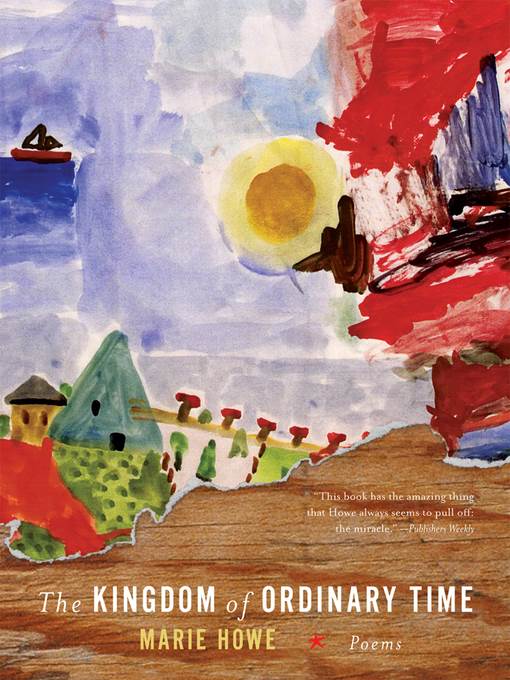
The Kingdom of Ordinary Time
Poems
- اطلاعات
- نقد و بررسی
- دیدگاه کاربران
نقد و بررسی

Starred review from November 3, 1997
The tentative transformation of agonizing, slow-motion loss into redemption is Howe's signal achievement in this wrenching second collection. Lyrical rhythms and flat, colloquial speech rub up against a not-quite-mock Old Testament rhetoric of the individual's moral imperative ("the compassionate fist of God opened and crushed her with gratitude and shame"), as Howe uncovers new potential for the personal poem. A brother, immobilized and dying of AIDS, becomes the center of the poet's obsessive consciousness, which ranges over a Catholic-school childhood punctuated by abuse at home, and everyday struggles for fulfillment as a middle-class adult woman. While more accessible than the poems of The Good Thief, which was a National Poetry Series winner for 1987, these 48 poems spread among three sections are just as rigorously crafted in their long, open lines of taut, precise language. "Memorial" typifies the book in its Whitman-like inclusion of multiple voices and candid depictions of sexual bodies and bodies in pain. The "I" of the collection can also be engagingly wry while disclosing a fallible self ("All those dogs barking in my dreams! And now, they know me and don't bark"), but it is her pauses over near photographic images, as in the close of "Reunion," that provide solace: "The whir of I should be, I should be, I should be/ slows to silence,// and the room steps back and stands there--/ the white cotton curtains hanging still." Stanley Kunitz, one of Howe's influences, has called her a religious poet, and this book demonstrates her power as a metaphysician for the coming century of fractured faith.

Starred review from February 4, 2008
SignatureReviewed by Brenda ShaughnessyMarie Howe's books of poetry materialize once a decade and are big news and cause for celebration. Both of her previous collections moved me to tears and have continued to move me. Reading her third is like finally having a very long thirst quenched. Howe's debut, The Good Thief, contains a poem, "Part of Eve's Discussion," which remains one of the most breathtaking out-of-body experiences in contemporary poetry: "...when it occurs to you/ your car could spin/.../ it was like that, and after that, it was still like that, only/ all the time." When I teach poetry classes, this is what I start with: it makes young poets want to write. Then there are the rapt, anguished poems about all-too-corporeal experiences in What the Living Do, which struggles to reckon with a beloved brother's death from AIDS as well as a rough-and-tumble childhood. Howe finds the flash point of illumination in the chaos of grief and murky memory. This book has become a classic text in coping with life, love and loss. How do we save each other, or how do we watch helplessly? How can we live with our memories or with losing them, or each other? Howe is the rare poet who offers answers to these questions. This third book unites and develops all the strength and beauty of the previous two. Metaphysical aspects of Thief find advanced life forms in mind-benders like "Limbo" ("Do I have an I?/ One says to another... ") and "Easter" a brilliant short poem about reanimation ("And the whole body was too small. Imagine/ the sky trying to fit into a tunnel carved into a hill"). The earthbound qualities of Living also find new form here: political, indeed global concerns are posited with signature clarity, expressing, through simple observation and empathy, the hope for more humane systems. A cycle of heartbreaking poems about motherhood, called "Life of Mary," looks back on the speaker's own dead mother, while other poems look straight into the moment, joyfully, reverently and always with a pause for reflection and amazement, with her daughter.Howe is a careful and soulful alchemist. She makes metaphor matter and material metaphysical. She becomes magic with her transforming perspective that is part mother, part muscle, part music, part mind. This book has the amazing thing that Howe always seems to pull off: the miracle. "I saw it./ It was the thing and spirit both: the real/ world: evident, invisible." (Mar.)Brenda Shaughnessy is the author of Interior with Sudden Joy (FSG, 1999) and the forthcoming Human Dark with Sugar (Copper Canyon, 2008), which won the 2007 James Laughlin Award. She is poetry editor of Tin House magazine.




دیدگاه کاربران